Breaking Free from Banks: The Promise and Potential of Decentralized Finance (DeFi)

Decentralised Finance (DeFi) is the latest buzzword in the financial industry, and for a good reason. DeFi can potentially revolutionise how we interact with money and financial services.
In this article, we'll explore:
- What is DeFi?
- Its benefits and potential risks
- Different types of DeFi applications
- How to get involved with DeFi?
- Its potential impact on traditional finance and banking
- A comparison of DeFi to other emerging technologies, and
- Real-world use cases for DeFi
Let's learn!
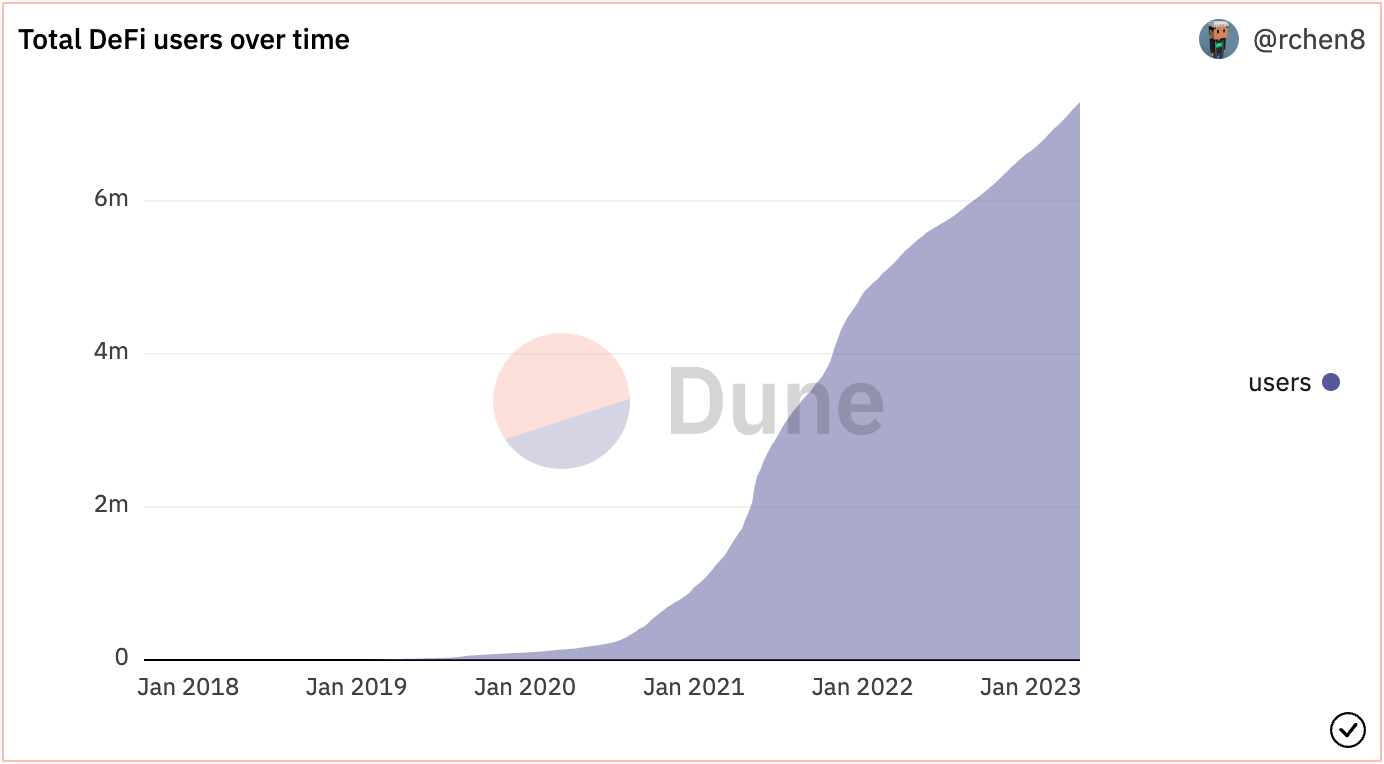
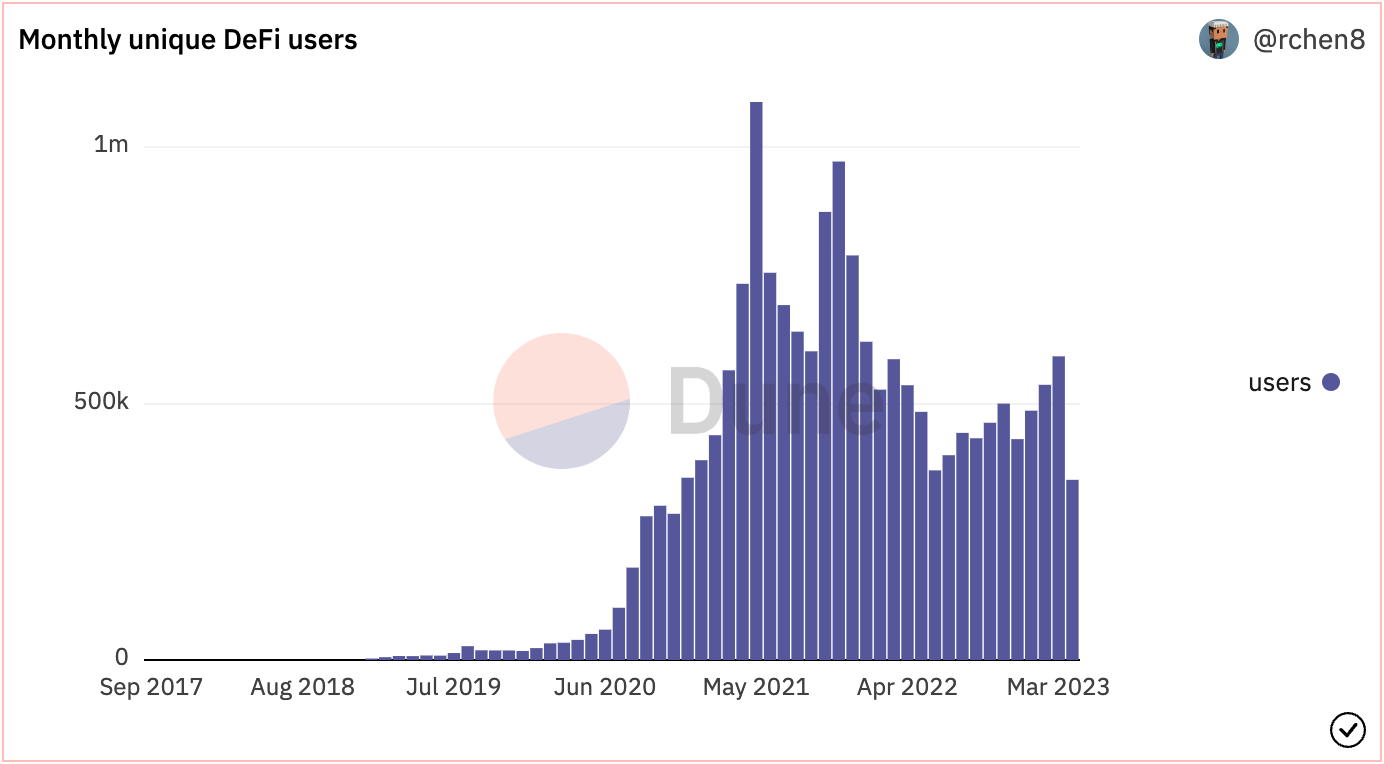
What is DeFi, and how does it differ from traditional finance?
- DeFi refers to a new financial system built on blockchain technology that operates in a decentralised manner.
- It seeks to offer financial services that are open, transparent, and accessible to everyone without relying on traditional financial institutions such as banks.
- In DeFi, "decentralised" refers to removing intermediaries and central authorities, such as banks and other financial institutions, from the financial system.
- This also means that there is no central point of control or failure, as the system is distributed across a network of computers rather than being owned or controlled by a single entity.
- Unlike traditional finance, DeFi applications are built on smart contracts, which are self-executing programs that automatically enforce the terms of an agreement.
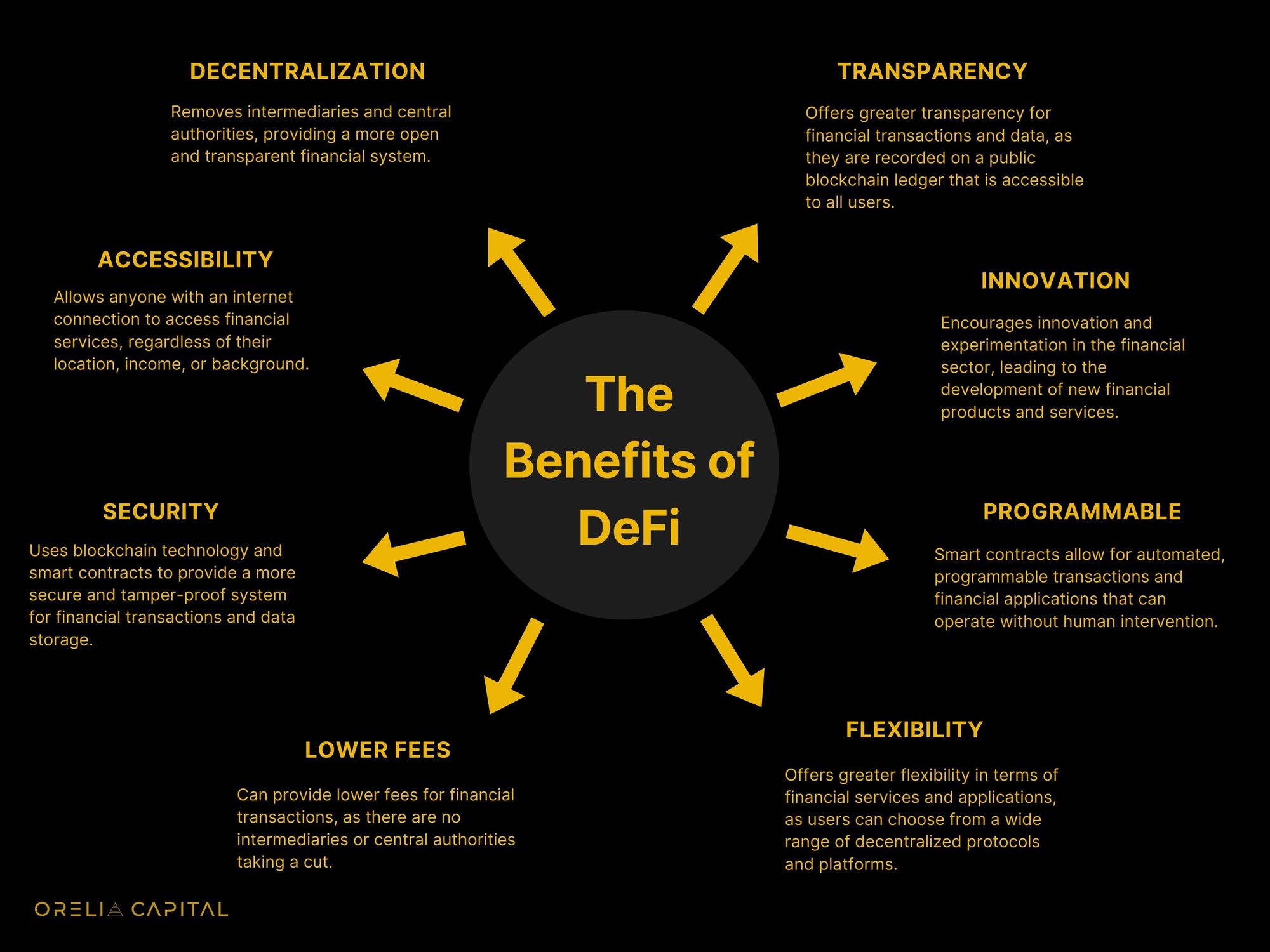
The potential risks of DeFi:
- Lack of regulation: DeFi is currently largely unregulated, meaning there are fewer protections for users and investors. This can lead to increased risks, such as fraud or theft, as well as potential market volatility and instability.
- Market volatility: DeFi is a relatively new and rapidly evolving market, and as such, it is subject to significant market volatility and instability. This can lead to sudden price swings and significant losses for investors.
- Smart contract vulnerabilities: DeFi relies heavily on smart contracts that are not immune to bugs or vulnerabilities. If a vulnerability is exploited, it can lead to significant losses for users and investors. Read more here.
- Liquidity risks: DeFi relies on liquidity pools, which are pools of assets used to facilitate trading on decentralised exchanges. However, if there is insufficient liquidity in a pool, it can lead to increased volatility and difficulty in trading assets.
- Counterparty risks: DeFi relies on peer-to-peer transactions, meaning that users rely on counterparties to fulfil their end of the transaction. If a counterparty defaults or fails to meet its obligations, it can lead to losses for the other party.
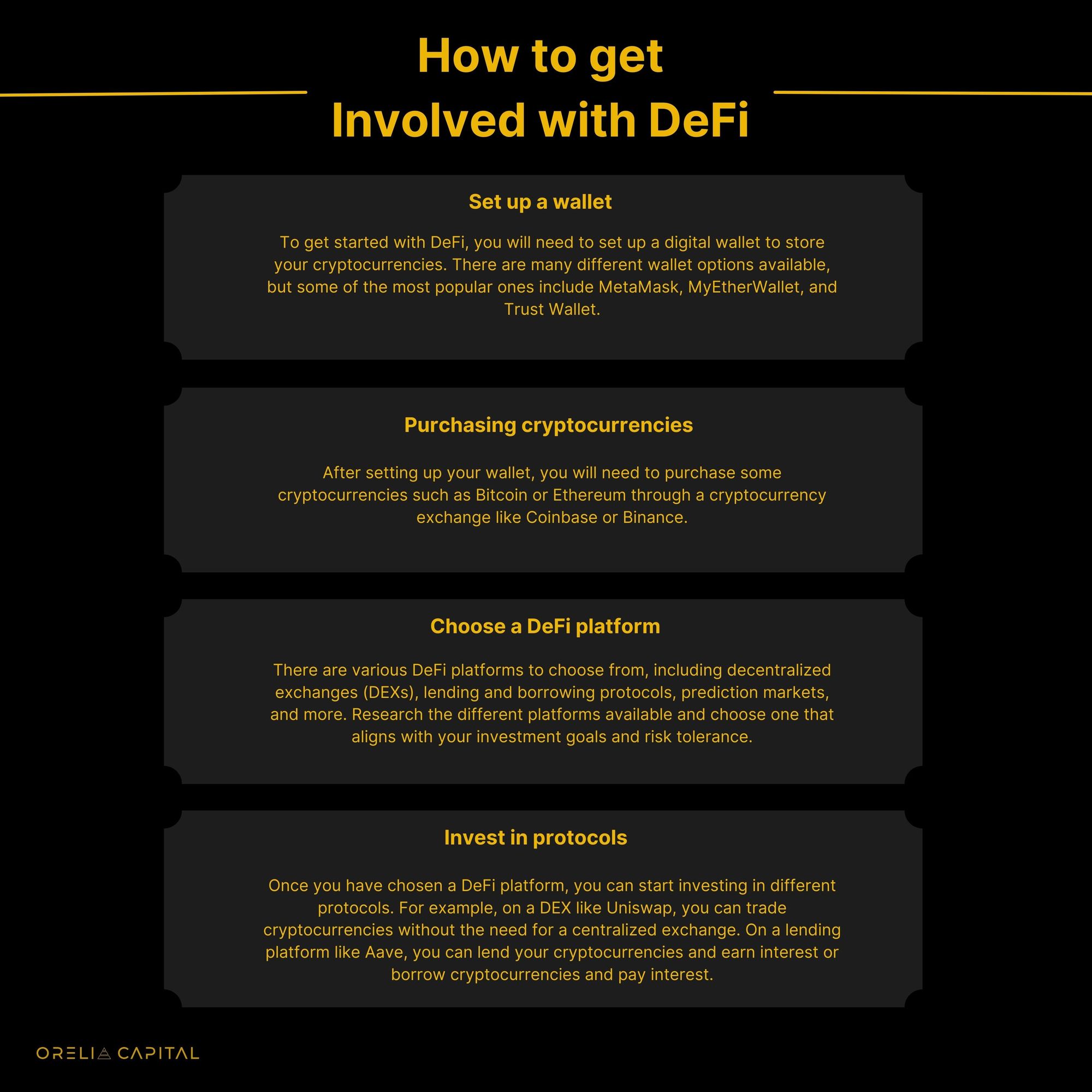
The potential impact of DeFi on traditional finance and banking:
- Disintermediation: DeFi removes intermediaries and central authorities, potentially disrupting traditional banking and financial institutions.
- Increased competition: DeFi creates new opportunities for competition and innovation in the financial sector, potentially leading to increased efficiency and lower consumer costs.
- Access to financial services: DeFi can provide access to financial services for underserved or underbanked people by traditional institutions.
- Transparency: DeFi can provide greater transparency and accountability in financial transactions, increasing trust and confidence in the financial system.
- Automation: DeFi can automate many financial transactions, potentially reducing the need for human intermediaries and increasing efficiency.
- Global reach: DeFi can facilitate cross-border transactions and financial services without traditional banking infrastructure, potentially increasing financial inclusion and access worldwide.
A comparison of DeFi to other emerging technologies such as blockchain and cryptocurrency:
- DeFi is a subset of blockchain technology, the underlying technology that powers cryptocurrencies such as Bitcoin and Ethereum.
- While blockchain and cryptocurrency focus primarily on digital currency and secure transactions, DeFi aims to create a decentralised financial ecosystem encompassing a more comprehensive range of financial services and applications.
- Unlike cryptocurrencies, which are primarily used for speculation and investment, DeFi protocols are designed to be used for practical purposes such as lending, borrowing, trading, and more.
- DeFi and cryptocurrency offer increased accessibility and transparency, as users can directly interact with the network and have greater control over their assets. However, DeFi offers increased security, eliminating the need for central authorities and intermediaries that can be vulnerable to hacks or other security breaches.
- While both DeFi and blockchain/cryptocurrency are still in their early stages of development, DeFi is considered by many to be the next frontier of blockchain technology, with the potential to transform the financial industry in significant ways.
Applications and Use Cases of DeFi:
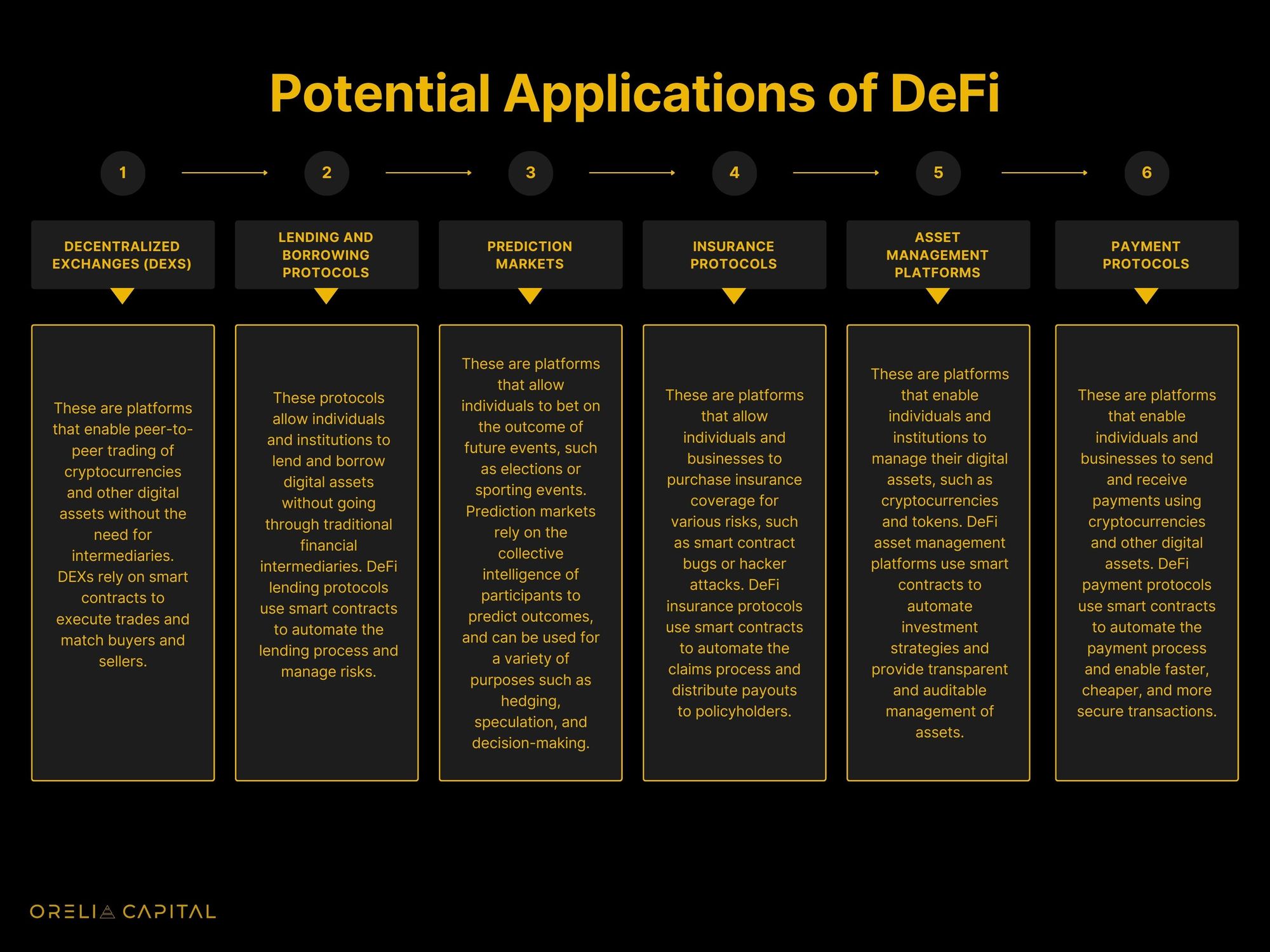
Other use cases of DeFi:
- Stablecoins: Cryptocurrencies that are designed to maintain a stable value, often pegged to the value of a fiat currency such as the US dollar.
- Remittances: DeFi can help reduce costs and increase speed and transparency in the remittance market, which involves sending money across borders to family or friends in other countries.
- Microfinance: DeFi can help individuals and small businesses access funding without going through traditional banks, particularly in underbanked or underserved areas.
- Decentralised identity: DeFi can enable individuals to own and control their digital identities without relying on centralised authorities or platforms.
- Supply chain finance: DeFi can help improve transparency and efficiency in supply chain finance by enabling direct peer-to-peer transactions and reducing the need for intermediaries.
These are just a few examples of the many applications and real-world use cases of DeFi. As technology evolves and matures, we can expect to see even more innovative use cases and applications emerge.
Conclusion
In conclusion, DeFi is an exciting and rapidly evolving field that has the potential to change the way we think about finance and banking. As with any emerging technology, there are potential risks and challenges, but the benefits and opportunities of DeFi are too great to ignore. By understanding the basics of DeFi, its potential use cases, and the different types of applications available, investors and users can start to explore this exciting new world of decentralised finance.
Learning Hub
- DEFI - The Future Of Finance Explained
- What are Smart Contracts?
- What are dApps?
- How to Get Started in DeFi?
- What is a Decentralised Exchange (Dex)
- About Uniswap (Dex)

We hope you enjoyed this edition of our newsletter. If you found it helpful, please consider sharing it with others who might benefit from this information.
At Orelia Capital, we believe that feedback is a gift. Your feedback can help us improve our content and provide more value to our readers.
